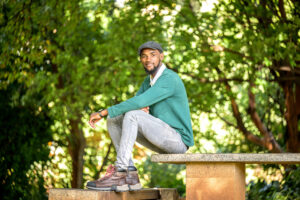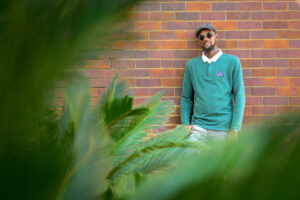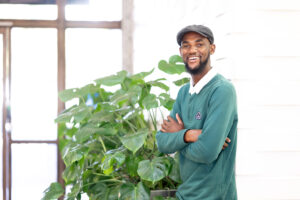
Oscar Sithole is a PhD candidate at the University of Pretoria, and a grantee of the CoE-FS. Photo EYEscape/CoE-FS.
Oscar Sithole is a PhD candidate in Development Studies at the University of Pretoria (UP). His journey into academia has been marked by perseverance, vision, and a deep commitment to achieving justice in South Africa’s food systems. In 2022, following his honours graduation, Sithole faced a difficult period: needing to take a gap year due to outstanding fees. But, he stayed in close contact with his mentor and supervisor, Dr Marc Wegerif, who encouraged him to reapply for National Research Foundation (NRF) funding. And so, with renewed support, this time linked to the DSTI-NRF Centre of Excellence in Food Security (CoE-FS), Sithole successfully secured funding and registered for his master’s degree.
“Coming from a poor black family [and] with no one else who had the opportunity to study at a university before … my academic life was reduced to a single instinct: survive. I still reminisce about those countless, sleepless nights I had in my small workspace inside my bedroom. But hard work pays off,” said the UP/CoE-FS graduate.
Sithole’s master’s research focused on the role of trolley and cart traders selling fresh produce in Soshanguve and other low-income urban areas in Gauteng. Now registered for his PhD, under the continued supervision of CoE-FS principal investigator Dr Wegerif, Sithole’s work builds on this foundation, to investigate the broader forces shaping South Africa’s food system. A key inspiration came from the widespread presence of trolley traders, who are mobile vendors selling fruits and vegetables directly at people’s doorsteps.
These traders, the PhD candidate explains, operate primarily in low-income areas such as townships, as well as high-traffic spaces including transport nodes, public markets, and bustling city intersections. During a short stay in Soshanguve, Sithole observed a new model of street vending that left a lasting impression:
“I first saw young men, mostly immigrants from the Southern African Development Community (SADC) countries, hawking fresh produce at people’s doorsteps. They attract customers by calling out the names of the goods they sell, like ‘Zambané’ (potato) or ‘aie’ (onion), or by using distinctive sounds like handbells or hooters.
“Walking along roads or sidewalks, they stop when customers approach, making sales at gates or fences. This sparked my interest, as it was my first time seeing such a mode of street vending, as I was only used to street traders hawking in stationary positions back home in Nelspruit,” explained Sithole.
Integration and analysis
Raised by a mother who was a small-scale farmer selling sweet potatoes in her local community, Sithole brings both academic curiosity and lived experience to his research. He is deeply motivated to understand the role trolley traders play in food security, particularly in areas like Soshanguve, where opportunities for local food production are scarce. His work highlights how, by providing fresh produce at affordable prices in accessible ways, these traders make a critical contribution to community food security, especially for those with limited access to formal grocery outlets.
While Sithole’s earlier work underscored the value of informal traders in improving local food access and affordability, his PhD research dives deeper into the power structures shaping South Africa’s food system. Challenging the notion that food systems are neutral or purely economic, he highlights how entrenched inequalities —rooted in historical injustice and reinforced by global neoliberal paradigms — continue to undermine food security for black South Africans.

Oscar Sithole brings both academic curiosity and lived experience to his research. Photo EYEscape/CoE-FS.
The CoE-FS grantee argues that mainstream food systems thinking, while helpful in mapping food from ‘seed to plate’, often fails to critically engage with issues of power, accumulation, and exploitation. He calls for a more urgent integration of power analysis into food systems discourse.
His critique is clear: South Africa’s food system is heavily dominated by a few large agribusinesses that control pricing and key resources such as seeds and fertilisers. This dominance limits the ability of around three million smallholder farmers to grow and distribute food sustainably.
Urbanisation adds further challenges. Sithole points to the inefficiencies and environmental costs of long supply chains:
“For example, produce grown in Worcester might travel to Cape Town, then be sold back in Worcester. This system benefits big companies with the resources to manage long supply chains, while smaller farmers and food producers struggle to compete.”
Trust-based economies
The UP graduate’s research tells a story of resilience in the face of inequality; of money and power shaping what people eat, and who gets to eat at all. South Africa’s dual food retail system reflects stark disparities. On one end are formal retailers: brands catering primarily to the middle and upper classes, often pricing out millions of poor South Africans. Their continued dominance, Sithole argues, is partly enabled by insufficient government regulation and the absence of effective price-monitoring policies.

Sithole’s PhD research dives deeper into the power structures shaping South Africa’s food system. Photo EYEscape/CoE-FS.
By contrast, the informal food sector remains vital in ensuring food access for low-income communities:
“Informal traders make nutritious food accessible to poor and working-class populations [who are] often excluded from formal markets. Through collective organisation and advocacy, they are demanding recognition and supportive policies. Their embeddedness in local communities fosters trust-based economies, including credit and surplus sharing. In doing so, they are not just feeding people; they are reshaping the vision of a just and inclusive food system.”
Looking forward
Sithole is committed to continuing his work in food systems transformation and is deeply grateful for the support provided by the CoE-FS, which is hosted by the University of the Western Cape (UWC) and his institution, UP. Through the CoE-FS, he has shared his work with wider audiences and developed crucial academic and professional skills.
“The CoE-FS has deepened my understanding of food and nutrition security as a complex, multidimensional issue. I learned that food insecurity encompasses not only hunger but also undernutrition, micronutrient deficiencies, and overnutrition.
“I now see food security as an outcome shaped by how food is produced, processed, distributed, retailed, consumed, and disposed of, with health and dietary implications. My confidence in tackling complex food systems and food security challenges has grown significantly through the CoE-FS’s support.”

Looking ahead, Sithole’s goals include publishing, contributing further to scholarly and policy discourse, and spending time at KU Leuven University. Photo EYEscape/CoE-FS.
Looking forward, Sithole plans to remain active in food system transformation initiatives and to continue collaborating with civil society groups. One of his key goals is to publish more academic papers and contribute further to scholarly and policy discourse. He also hopes to spend time at KU Leuven University in Belgium, where he aims to strengthen his academic expertise through cross-cultural exchange and advanced coursework.
Sithole’s work is a powerful reminder of the need for more equitable, people-centred approaches to food security. His research not only uplifts the voices of informal traders and small-scale food actors but also challenges the status quo, laying the groundwork for a more just and inclusive food system in South Africa and beyond.
related Articles
Dr Degracious Kgoale’s mission to improve food safety in informal markets
Dr Degracious Kgoale is the first in her family to hold a doctorate. Photo EYEscape/CoE-FS. Degracious Moloko Kgoale, who recently…
Dr Mondli Masanabo’s path of passion, perseverance, and purpose
Dr Mondli Masanabo graduated with a PhD in Food Science from CoE-FS co-host, the University of Pretoria. Photo EYEscape/CoE-FS. When…
Meet the grantee: Thato Mokgalagadi
Thato Mokgalagadi, a student currently doing her MSocSci Development Studies degree at CoE-FS co-host institution, the University of Pretoria. Photo:…



